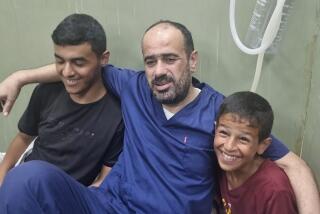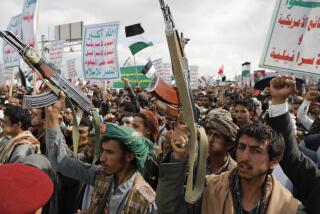Egypt arrests prominent Muslim Brotherhood spokesman
CAIRO — Demonstrating determination to quash the Muslim Brotherhood rather than seek to draw the Islamist group back into the political fold, Egyptian authorities on Tuesday arrested a prominent spokesman for the organization and renewed a freeze on the financial assets of senior leaders.
The latest steps by the interim government, reported by Egypt’s state news agency MENA, appeared to be an effort to capitalize on the strong anti-Brotherhood sentiment that cuts across much of the country’s political spectrum and has buoyed the interim government.
Armed forces commander Gen. Abdel Fattah Sisi, viewed as the key architect of the July 3 coup against Islamist President Mohamed Morsi and a subsequent bloody crackdown on Morsi’s followers, is being publicly lionized and urged by fervent supporters to run for president.
FOR THE RECORD:
Previously, the photo on this story was incorrectly credited to AFP/Getty Images.
After more than 21/2 years of turmoil spawned by the revolution that toppled autocrat Hosni Mubarak in 2011, the authoritarian bent of the current administration is doing little to damp popular acclaim for Sisi.
Meanwhile, most of the Muslim Brotherhood’s leadership is imprisoned, as are hundreds of rank-and-file followers. Human rights groups have sharply criticized conditions under which the detainees are being held, and say many prisoners have been denied basic rights. The use of military trials has also risen dramatically.
In continued pressure on the Brotherhood, its main English-language spokesman, Gehad Haddad, was arrested Tuesday in Cairo and charged with incitement, MENA said.
Haddad, whose linguistic ability and regular presence on Twitter helped him present a moderate face of the Brotherhood to the world press, was a highly visible figure, though his degree of influence within the organization was hard to gauge.
Augmenting the squeeze on the Brotherhood, a court ruled Tuesday that financial assets of senior leaders would remain frozen. The Cairo Criminal Court upheld a previous order to temporarily freeze the assets of several of the organization’s top officials, including spiritual leader Mohamed Badie and his deputies, the state news agency said.
Morsi, the country’s first democratically elected president, has been held by the military in an undisclosed location since the army drove him from power, deeply unpopular after a year in office. He is facing an array of legal accusations, including some murder-related charges stemming from the deaths of protesters.
Last week, Morsi was given a further 30 days of detention, an announcement that came late Friday, after his supporters had held scattered protests demanding his reinstatement. Despite Brotherhood efforts to rally a protest movement, demonstrations have remained small since a violent crackdown by the government last month.
To allay members’ well-founded fears of arrest, the group’s leadership has sought to use legal tactics to express defiance, such as urging Brotherhood followers to ride the city subway at specific times with the aim of tying up public transit in crowded Cairo, or switching off their cellphones at a particular time as a token of dissent.
Hundreds of Morsi supporters died in the violent breakup of protest camps by Egyptian security forces in mid-August. Authorities have since kept a tight grip on the capital, and a curfew remains in effect, together with a nationwide state of emergency, which gives the authorities wide-ranging powers to keep a lid on domestic dissent.
Special correspondent Ingy Hassieb contributed to this report.
More to Read
Sign up for Essential California
The most important California stories and recommendations in your inbox every morning.
You may occasionally receive promotional content from the Los Angeles Times.










